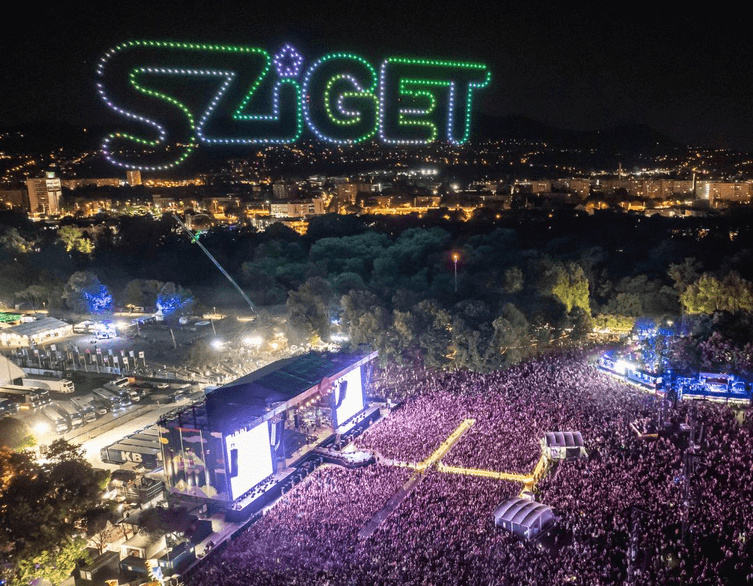Sziget Festival’s Uncertain Future: Latest Developments Point to Tight Deadline and Growing Pressure

Budapest’s iconic Sziget Festival is racing against time as new developments reveal intensifying pressure from multiple fronts to secure the event’s future. Since the initial announcement of the festival’s precarious situation in mid-October, several significant players have entered the conversation, each adding urgency to the rescue efforts.
Europe’s Major Festivals Rally Behind Sziget
In an unprecedented show of solidarity, Yourope, the influential European festival association representing major events including Primavera, Lollapalooza, and Roskilde, has written directly to Budapest Mayor Gergely Karácsony urging municipal support for Sziget’s survival. The letter, shared with media by a festival industry insider, emphasizes that Sziget represents far more than a music event—it’s one of Budapest and Hungary’s most important cultural brands, embodying core values of freedom, openness, and diversity.
Yourope’s letter makes specific recommendations: the Budapest municipal government should negotiate long-term, favorable contracts with Sziget’s prospective new Hungarian owners and streamline permit processes. According to the association, these measures would help the festival maintain its current scale and international significance while improving financial sustainability. The intervention underscores how Sziget’s potential demise is being watched with concern throughout the European festival community.
A Question of Trust and Tight Timelines
Fresh reporting reveals why festival founder Károly Gerendai was specifically brought back into the picture: rebuilding confidence among investors and partners. According to unnamed industry sources, despite previous contracts, internal skepticism about the festival’s profitability had become entrenched in recent years. By involving Gerendai again, current management aims to reassure and win back those who had lost faith in the festival’s financial viability.
Best deals of Budapest
The timeline is becoming increasingly critical. Gerendai has stated that negotiations must conclude by the end of October, emphasizing that the festival is already running two months behind schedule on ticket sales. Normally, by this time in October, major headliners would be announced and tickets would be selling briskly. Every passing week without resolution makes organizing a proper 2026 festival more challenging and economically precarious.
The 30 Billion Forint Question
Adding weight to the rescue efforts, GKI Economic Research released a comprehensive analysis quantifying the potential economic shock if Sziget were canceled in 2026. The research institute calculated that direct financial losses from foregone tourism and hospitality revenue, combined with lost state tax income, would exceed 30 billion forints. When multiplier effects are considered—the ripple impacts through supply chains, employment, and related sectors—the total GDP impact would be substantially larger.
The analysis emphasizes that this wouldn’t represent a gradual economic slowdown but rather a targeted shock hitting tourism, hospitality, and retail with concentrated force. During festival week in 2024, Budapest hotel revenues reached 7.9 billion forints, a 37 percent increase over the previous week, while international guest nights in the festival’s host district multiplied eighteen-fold. Many businesses depend on this annual surge for their survival.
Beyond immediate financial impacts, GKI warns of significant reputational damage. Sziget has become integral to Budapest’s international image, particularly among visitors under 34 who often visit Hungary specifically for the festival. The event’s cancellation would negatively affect not only current tourism but future visitor numbers, creating a strategic disadvantage in regional competition.
Political Voices Enter the Debate
The crisis has attracted political attention, with Democratic Coalition city representative Tibor Déri proposing conditions for any municipal support. In a Facebook post, Déri argued that Sziget has drifted from its origins as a Budapest festival for Hungarian youth, becoming instead primarily an event for wealthier foreign tourists while remaining financially inaccessible to local young people.
Déri’s proposal is straightforward: if the city makes concessions worth hundreds of millions of forints to save the festival, Hungarian youth should receive equivalent discounts on tickets and passes. “This would be real partnership: not for money, but for community value. Whatever money the city foregoes, young Hungarians should receive that much in discounts,” he stated. His position reflects concerns about the festival’s accessibility and whether public support should come with strings attached ensuring benefits for local residents.
Mayor’s Difficult Balancing Act
Mayor Karácsony finds himself navigating a complex situation. Budapest’s opposition-led municipal government operates under ongoing pressure from the national government, which has systematically limited local autonomy, particularly for opposition-controlled municipalities. The city struggles to access its own financial resources while facing continuously rising maintenance costs.
Karácsony has acknowledged that while Budapest shouldn’t interfere in private business decisions, the city has a responsibility to protect the long-term survival of this cultural landmark. He expressed hope that the contract termination doesn’t signal the end of an era but rather the beginning of something new, stating that if the festival’s future can be secured through business arrangements preserving its core values, Budapest should remain open to this new beginning.
The mayor noted that terminating the old contract may be necessary before negotiating a new agreement with potential new Hungarian owners. This procedural step, while creating temporary uncertainty, could facilitate the transition to new ownership and a more sustainable operating model.
The Clock Keeps Ticking
As October progresses, the window for saving the 2026 festival continues to narrow. Gerendai remains cautiously optimistic about reaching an agreement with current owners before month’s end, though he emphasizes nothing is signed yet. He’s made clear the rescue won’t happen alone and specifically won’t involve government-connected partners, instead envisioning collaboration with multiple smaller stakeholders whose businesses depend on the festival’s success.
The situation highlights broader challenges facing mid-sized festivals across Europe—events large enough to have significant economic impact but lacking the financial cushion of mega-festivals like Glastonbury or Tomorrowland. With production costs, artist fees, and operational expenses continuing to climb while consumer budgets tighten, festivals in Sziget’s category face existential pressure.
For now, international visitors who’ve made Sziget an annual pilgrimage, local businesses dependent on festival week revenue, and the thousands of workers employed by the event wait anxiously. The coming days will reveal whether negotiations succeed in time to begin organizing the 2026 festival, or whether Budapest’s summer landscape will face an unprecedented gap where its most famous cultural gathering once stood.
Related news
















